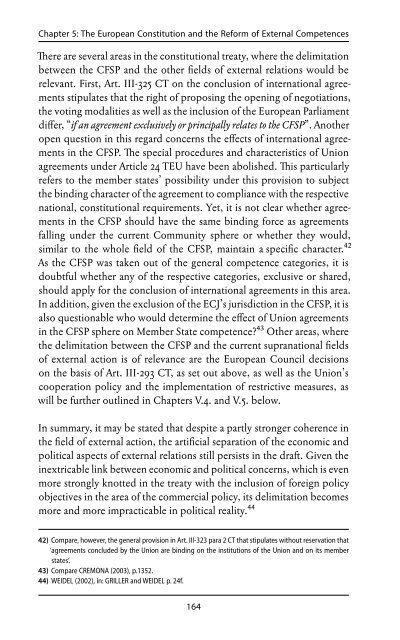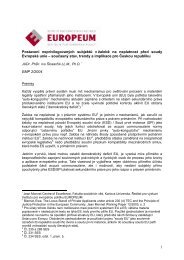eu constitutionalisation - EUROPEUM Institute for European Policy
eu constitutionalisation - EUROPEUM Institute for European Policy
eu constitutionalisation - EUROPEUM Institute for European Policy
You also want an ePaper? Increase the reach of your titles
YUMPU automatically turns print PDFs into web optimized ePapers that Google loves.
Chapter 5: The <strong>European</strong> Constitution and the Re<strong>for</strong>m of External CompetencesThere are several areas in the constitutional treaty, where the delimitationbetween the CFSP and the other fields of external relations would berelevant. First, Art. III-325 CT on the conclusion of international agreementsstipulates that the right of proposing the opening of negotiations,the voting modalities as well as the inclusion of the <strong>European</strong> Parliamentdiffer, “if an agreement exclusively or principally relates to the CFSP”. Anotheropen question in this regard concerns the effects of international agreementsin the CFSP. The special procedures and characteristics of Unionagreements under Article 24 TEU have been abolished. This particularlyrefers to the member states’ possibility under this provision to subjectthe binding character of the agreement to compliance with the respectivenational, constitutional requirements. Yet, it is not clear whether agreementsin the CFSP should have the same binding <strong>for</strong>ce as agreementsfalling under the current Community sphere or whether they would,similar to the whole field of the CFSP, maintain a specific character.⁴²As the CFSP was taken out of the general competence categories, it isdoubtful whether any of the respective categories, exclusive or shared,should apply <strong>for</strong> the conclusion of international agreements in this area.In addition, given the exclusion of the ECJ’s jurisdiction in the CFSP, it isalso questionable who would determine the effect of Union agreementsin the CFSP sphere on Member State competence?⁴³ Other areas, wherethe delimitation between the CFSP and the current supranational fieldsof external action is of relevance are the <strong>European</strong> Council decisionson the basis of Art. III-293 CT, as set out above, as well as the Union’scooperation policy and the implementation of restrictive measures, aswill be further outlined in Chapters V.4. and V.5. below.In summary, it may be stated that despite a partly stronger coherence inthe field of external action, the artificial separation of the economic andpolitical aspects of external relations still persists in the draft. Given theinextricable link between economic and political concerns, which is evenmore strongly knotted in the treaty with the inclusion of <strong>for</strong>eign policyobjectives in the area of the commercial policy, its delimitation becomesmore and more impracticable in political reality.⁴⁴42) Compare, however, the general provision in Art. III-323 para 2 CT that stipulates without reservation that‘agreements concluded by the Union are binding on the institutions of the Union and on its memberstates’.43) Compare CREMONA (2003), p.1352.44) WEIDEL (2002), in: GRILLER and WEIDEL p. 24f.164Chapter 5: The <strong>European</strong> Constitution and the Re<strong>for</strong>m of External CompetencesV.2.2. The Proposed New CompetenceProvisions in the CFSP/CSDPa. IntroductionLooking at the individual competence provisions in Title V, it seems thatthe Articles on CFSP do not contain any radical changes to the currentTitle V TEU. The emphasis is still on broadly worded objectives ratherthan a precise delimitation of subject matter or a definition of the kind ofcompetences conferred upon the Union.⁴⁵ With the abolition of specificCFSP objectives and their integration in commonly defined targets <strong>for</strong> theentire field of external relations, the definition of CFSP competences wouldcertainly not become easier. In contrast, substantive amendments weremade in the CSDP⁴⁶, where the constitutional treaty, above all, sought toincrease the member states’ obligations to provide military and civil capacitiesand to procure mutual assistance in the case of crises. At the same time,the competence provisions in the CSDP involve an increased element offlexibility by focusing on a long-term or case-by-case cooperation of certaingroups of member states.⁴⁷The general legal basis <strong>for</strong> CFSP and CSDP in Part I of the constitutionaltreaty is provided in Art. I-12 para 4 CT. “The Union shall have competence todefine and implement a common <strong>for</strong>eign and security policy, including the progressiveframing of a common defence policy.” According to Art. I-16 CT, thiscompetence covers all areas of <strong>for</strong>eign policy and all questions relatingto the Union’s security, including the progressive framing of a commondefence policy, which might lead to a common defence. Member states areobliged to support the Union’s common <strong>for</strong>eign and security policy andadhere to the acts adopted in this area (Art I-16 para 2). A first notable differencein the constitutional treaty lies in the determination of the politicalstatement contained in Art. I-41 para 2 CT providing that the progressiveframing of a defence policy will, and not only might, lead to a commondefence, when the <strong>European</strong> Council acting unanimously, so decides(compare current Art 17 TEU). The <strong>European</strong> Council would by decisionrecommend to the member states the adoption of a decision in accord-45) EECKHOUT (2004), p.139.46) The differentiation between CFSP and CSDP in this contribution shall not withstand the fact that the CSDPis an integral part of the CFSP (Art. I-41 para 1).47) CREMONA (2003), p.1360.165








